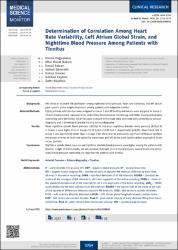| dc.contributor.author | Değirmenci, Hünü | |
| dc.contributor.author | Bakırcı, Eftal Murat | |
| dc.contributor.author | Salcan, İsmail | |
| dc.contributor.author | Demirelli, Selami | |
| dc.contributor.author | Duman, Hakan | |
| dc.contributor.author | Ceyhun, Gökhan | |
| dc.contributor.author | Küçüksu, Zafer | |
| dc.date.accessioned | 2020-12-19T20:13:16Z | |
| dc.date.available | 2020-12-19T20:13:16Z | |
| dc.date.issued | 2014 | |
| dc.identifier.citation | Degirmanci, H., Bakirci, E.M., Salcan, I., Demirelli, S., Duman, H., Ceyhun, G., Kucuksu, Z., (2014).Determination of Correlation Among Heart Rate Variability, Left Atrium Global Strain, and Nighttime Blood Pressure Among Patients with Tinnitus.Medical Science Monitor, 20. | |
| dc.identifier.issn | 1234-1010 | |
| dc.identifier.uri | https://doi.org/10.12659/MSM.890949 | |
| dc.identifier.uri | https://hdl.handle.net/11436/3997 | |
| dc.description | PubMed: 25249354 | en_US |
| dc.description.abstract | Background: We aimed to examine the correlation among nighttime blood pressure, heart rate variability, and left atrium peak systolic global longitudinal strain among patients with subjective tinnitus.Material/Methods: Eighty patients with tinnitus were assigned to Group 1 and 80 healthy individuals were assigned to Group 2. Clinical blood pressure measurements, ambulatory blood pressure monitoring, and Holter electrocardiography monitoring were performed. All of the cases included in the study were examined with conventional echocardiography and 2-dimensional speckle tracking echocardiography.Results: Mean nighttime systolic blood pressure (130.3±5.4) and mean nighttime diastolic blood pressure (82.8±3.9) in Group 1 were higher than in Group 2 (125.1±5.4 and 80.7±4.7, respectively) (p<0.05). Mean heart rate in Group 1 was significantly lower than in Group 2 but there was no statistically significant difference between the groups in terms of heart rate variability parameters and left atrium peak systolic global longitudinal strain values (p>0.05).Conclusions: Nighttime systolic blood pressure and nighttime diastolic blood pressure were higher among the patients with tinnitus. In light of these results, we can conclude that both clinical blood pressure measurement and ambulatory blood pressure monitoring are important for patients with tinnitus. © 2014, Med Sci Monit. | en_US |
| dc.language.iso | eng | en_US |
| dc.publisher | International Scientific Literature Inc. | en_US |
| dc.rights | info:eu-repo/semantics/openAccess | en_US |
| dc.subject | Arterial pressure | en_US |
| dc.subject | Echocardiography | en_US |
| dc.subject | Tinnitus | en_US |
| dc.title | Determination of correlation among heart rate variability, left atrium global strain, and nighttime blood pressure among patients with tinnitus | en_US |
| dc.type | article | en_US |
| dc.contributor.department | RTEÜ, Tıp Fakültesi, Dahili Tıp Bilimleri Bölümü | en_US |
| dc.contributor.institutionauthor | Duman, Hakan | |
| dc.identifier.doi | 10.12659/MSM.890949 | |
| dc.identifier.volume | 20 | en_US |
| dc.identifier.startpage | 1714 | en_US |
| dc.identifier.endpage | 1719 | en_US |
| dc.relation.journal | Medical Science Monitor | en_US |
| dc.relation.publicationcategory | Makale - Uluslararası Hakemli Dergi - Kurum Öğretim Elemanı | en_US |


















